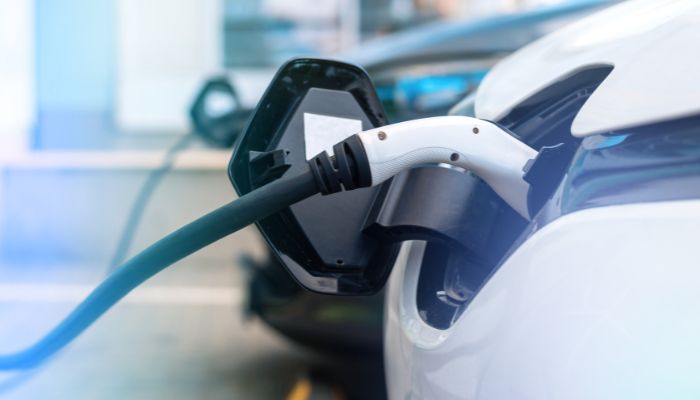India has committed to achieving net-zero greenhouse gas emissions by 2070. The electric vehicle (EV) industry plays a pivotal role in driving this vision by accelerating the adoption of electric vehicles for various purposes across the country. At the same time, it is creating a wide range of job opportunities for young professionals, offering dynamic roles and promising career growth.
This article explores the evolving landscape of India’s EV industry, highlights the most in-demand job roles and essential skills, and provides an overview of key courses and certifications valuable for individuals aspiring to build a career in this rapidly growing sector.
EV Industry Trends in India
The annual sales of Electric Vehicles (EVs) in India have witnessed exponential growth — rising from approximately 50,000 units in 2016 to 2.08 million units in 2024. As of 2024, the total EV stock in the country stands at around 5.45 million, accounting for nearly 9% of the global EV stock. India has also set an ambitious target of achieving 30% of overall vehicle sales from EVs by 2030.
Several government initiatives drive the growth of the EV industry in India. The Phase II of the Faster Adoption and Manufacturing of Hybrid and Electric Vehicles (FAME) scheme, with a budget outlay of ₹10,000 crore, has accelerated the adoption of electric three-wheelers (e-3W), four-wheelers (e-4W), and e-buses for commercial use through targeted incentives. In addition, the Scheme to Promote Manufacturing of Electric Passenger Cars in India (SPMEPCI), launched on March 15, 2024, aims to boost domestic EV manufacturing, creating new employment opportunities for local talents.
As of August 2025, a total of 29,277 Public EV Charging Stations (EVCS) have been installed across the country. Furthermore, ₹2,000 crore has been allocated under the PM E-DRIVE Scheme to expand charging infrastructure and meet future energy demands. To enhance awareness and ensure sustainability goals, the government has also launched e-Amrit, a dedicated portal providing information on EV incentives, policies, and related services.
In-demand Careers in India’s EV Sector
1.EV Design Engineer
Role: Designs vehicle architecture and integrates major systems—battery, powertrain, and thermal—to meet performance, safety, and cost targets.
Skills Required: Mechanical/automotive engineering, CAD tools (CATIA/SolidWorks), GD&T, fundamentals of high-voltage (HV) safety.
Average Annual Salary: ₹6–15 lakh per year
2.Battery Chemist / Cell R&D Specialist
Role: Develops and optimises electrode materials, electrolytes, and cell chemistry to enhance energy density and lifecycle.
Skills Required: Fundamentals of electrochemistry, test design, data analysis, and knowledge of safety standards.
Average Annual Salary: ₹8–20+ lakh per year
3.BMS (Battery Management System) Engineer
Role: Designs hardware and firmware for monitoring batteries, estimating state of charge (SOC), and ensuring system safety.
Skills Required: Embedded C/C++, control algorithms, SOC/SOH estimation, cell balancing, safety diagnostics.
Average Annual Salary: ₹5–17+ lakh per year
4.Power Electronics / Inverter Engineer
Role: Designs traction inverters and converters to efficiently convert battery energy into motion.
Skills Required: PSIM, PLECS, MATLAB-Simulink, SiC/GaN device knowledge, control loops, magnetics, and thermal management.
Average Annual Salary: ₹2–15+ lakh per year
5.Electric Motor / Drive Control Engineer
Role: Designs motors, rotors, and stators; oversees mechanical integration, NVH (noise, vibration, harshness), and cooling.
Skills Required: Control theory, MATLAB/Simulink, real-time targets, and sensor systems (resolver/encoder).
Average Annual Salary: ₹6–18+ lakh per year
6.Thermal Management Engineer
Role: Ensures vehicle performance and safety through effective cooling and heating strategies for battery packs and e-powertrain systems.
Skills Required: Heat transfer, CFD basics, material selection, thermal interface materials (TIMs), and sensor- control integration.
Average Annual Salary: ₹6–14 lakh per year
7.EV Service Technician
Role: Handles high-voltage servicing, diagnostics, and preventive maintenance of EV subsystems.
Skills Required: HV safety, battery servicing basics, motor/drive diagnostics, use of diagnostic tools (multimeter, insulation tester, scanners), and PPE compliance.
Average Annual Salary: ₹2–5 lakh per year
8.Charging Infrastructure Technician
Role: Installs and maintains AC/DC chargers, ensuring grid connectivity and compliance with safety standards.
Skills Required: Power distribution fundamentals, earthing and protection, charger commissioning, power electronics basics, SCADA for operations and maintenance.
Average Annual Salary: ₹2–4 lakh per year
9.Site Manager (EV Charging Operations)
Role: Manages multi-site charging operations, including energy procurement, uptime, billing, and customer experience.
Skills Required: Charger protocols (OCPP), site energy and load management, billing/roaming systems, Excel/SQL, and asset management.
Average Annual Salary: ₹5–12 lakh per year
10.Quality Control / Test Engineer
Role: Conducts testing and validation for cells, battery packs, motors, power electronics, and vehicle systems.
Skills Required: Test planning, instrumentation, failure analysis, IS/IEC standards, FMEA, and familiarity with test benches and environmental chambers.
Average Annual Salary: ₹4–10 lakh per year
11.Manufacturing / Process Engineer
Role: Develops and scales production lines, implements automation, and ensures defect reduction and efficiency improvement.
Skills Required: Process design, lean manufacturing, SPC, automation/PLC basics, MES/ERP familiarity, Six Sigma principles.
Average Annual Salary: ₹5–12+ lakh per year
12.Fleet Electrification / Operations Manager
Role: Plans and manages electrified fleets, covering depot charging, total cost of ownership (TCO) modelling, and scheduling.
Skills Required: Depot design, load management, TCO analysis, battery lifecycle planning, fleet management software, Excel/Power BI, energy modelling.
Average Annual Salary: ₹6–15 lakh per year
13.Battery Recycling / End-of-Life (EOL) Specialist
Role: Develops recycling and second-life solutions for EV batteries and ensures compliance with e-waste regulations.
Skills Required: Hydrometallurgical and pyrometallurgical processes, pack disassembly, hazardous waste handling, material recovery, and life-cycle analysis tools.
Average Annual Salary: ₹6–15+ lakh per year
Note: The salaries mentioned above are approximate, sourced from platforms such as Glassdoor, Ambitionbox, etc.
EV Courses and Training Programs in India
Building a career in the Electric Vehicle (EV) industry requires a strong foundation in electrical engineering, battery management, vehicle design, and emerging mobility technologies. Below is a list of reputable institutions and online platforms in India that offer specialised degree programs and certifications, helping professionals establish a career in the EV industry.
Full-Time Degree Programs
- M.Tech in Electric Transportation (Online) – IIT Kharagpur
- M.Tech in EV Technology (Online) – IIT Hyderabad
- e-Postgraduate Diploma in E-Mobility (Online + Campus Immersion) – IIT Bombay
Short-Term Certifications and Courses
- Certificate Program on Electric Vehicles (CPEV) – IIT Madras (CODE)
- EV Courses on NPTEL / SWAYAM – Offered by IIT faculty
- EV Testing & Certification Programmes – ARAI (Automotive Research Association of India)
- EVSE, High-Voltage Safety, and EV Technician Certificates – SAE International
- Electric Vehicle Service Lead Technician Program – Skill India Digital Hub
- Electric Vehicles and Mobility – Coursera
The EV industry in India stands at the forefront of the country’s clean energy transition, offering immense potential for sustainable growth and innovation. As government initiatives, technological advancements, and private investments continue to accelerate, the sector is poised to generate millions of new jobs for young talent across the country. By acquiring relevant technical expertise and industry-relevant certifications, they can build a solid career and contribute to India’s path toward a greener future.






